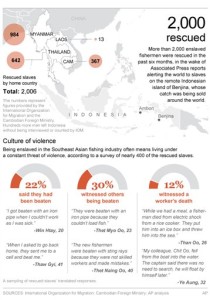Indonesian Fisherman
‘Change can come from consumers…’
September 17, 2015AP Investigates/reports:
‘More than 2,000 fishermen have been rescued this year from brutal conditions at sea, liberated as a result of an Associated Press investigation into seafood brought to the U.S. from a slave island in eastern Indonesia.’
{…}
‘…after the AP tracked fish — caught by men who were savagely beaten and caged — to the supply chains of some of America’s biggest food sellers, such as Wal-Mart, Sysco and Kroger, and popular brands of canned pet food like Fancy Feast, Meow Mix and Iams. It can turn up as calamari at fine restaurants, as imitation crab in a sushi roll or as packages of frozen snapper relabeled with store brands that land on our dinner tables. The U.S. companies have all said they strongly condemn labor abuse and are taking steps to prevent it.’
{…}
‘Many experts believe the most effective pressure for change can come from consumers, whose hunger for cheap seafood is helping fuel the massive labor abuses.’
{…}
‘Amid the increased scrutiny, some have taken legal action. In the past month, three separate class-action lawsuits have been filed naming Mars Inc., IAMS Co., Proctor & Gamble, Nestle USA Inc., Nestle Purina Petcare Co. and Costco, accusing them of having seafood supply chains tainted with slave labor. Ashley Klann, a spokeswoman for the Seattle-based law firm behind several of the cases, said the litigation “came as a result of AP’s reporting.”
http://bigstory.ap.org/urn:publicid:ap.org:ceecf8df237e49bf8fe59d47fa3515b0
